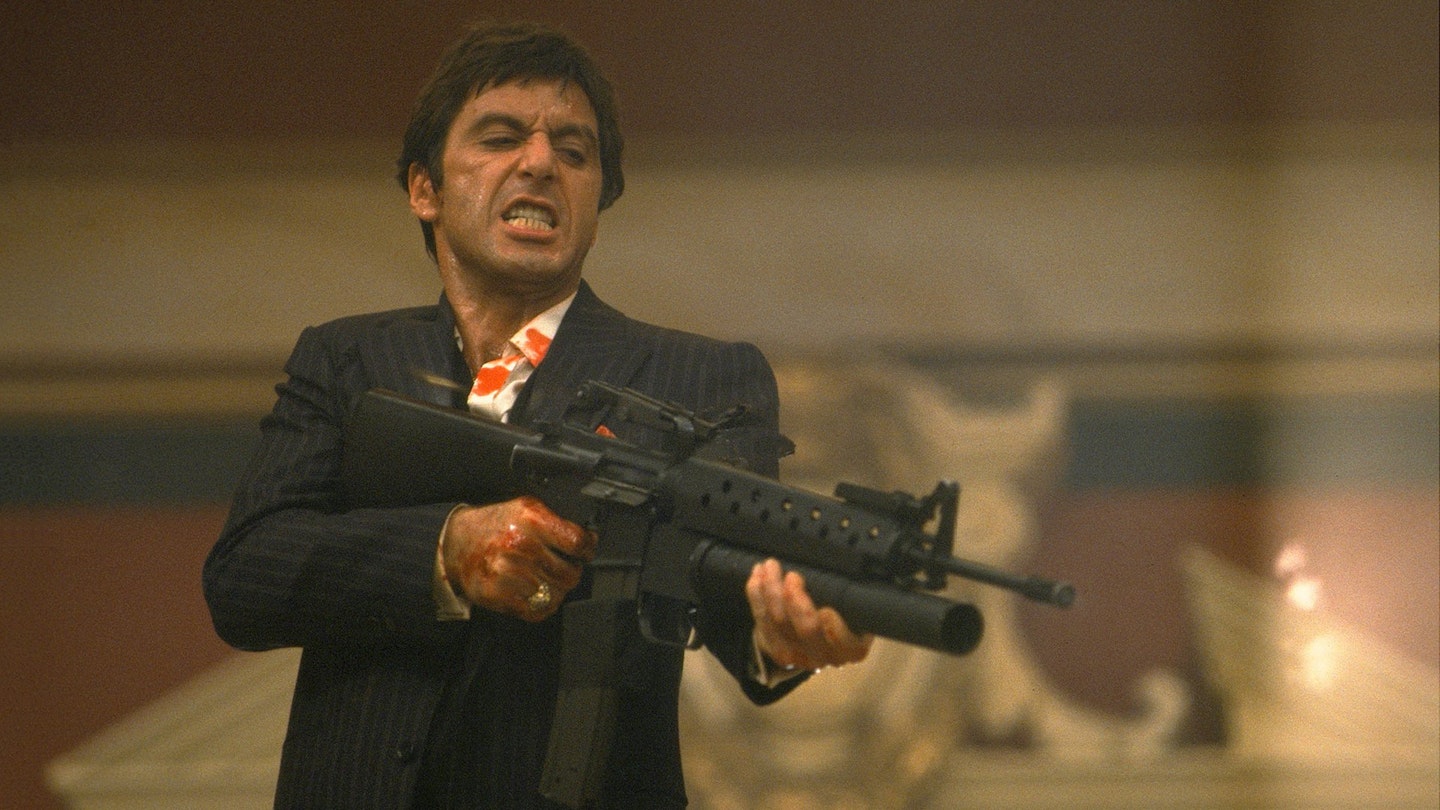This week sees the release on Blu-ray of Scarface, Brian de Palma's scorching 1983 crime drama starring a blistering Al Pacino along with Michelle Pfeiffer, Steven Bauer, F. Murray Abraham, Mary Elizabeth Mastrantonio and Robert Loggia. From an Oliver Stone script telling the story of a crime lord's rise to power, it's become both a mainstream and cult classic, admired for Pacino's balls-to-the-wall portrayal of Tony Montana and the dark side of the American dream. To celebrate the Blu-ray release, the good folk at Universal have allowed us to print extracts from the exclusive new booklet that accompanies the special edition Blu-ray "cigar box" by author Lawrence Grobel. Read on to learn more about how the film came about, the role cocaine played and the influence of...Meryl Streep?
I had been friends with Al Pacino for three years when he began shooting Scarface in 1982, and we had had some conversations about his interest in doing a remake of the 1932 Howard Hawks film starring Paul Muni.
"I had heard about Scarface for a long time," he told me. "It was the model for all gangster pictures. When I saw it, it had a real feeling to it, a grand feeling, and it had a great performance by Paul Muni. He did something different. I thought it would be interesting to do a remake of this, in another way. So I called [producer] Marty Bregman, and he saw it and got very excited."
Pacino originally wanted to keep it a period piece, but realised that because of its melodramatic nature it would be hard to pull off. "I was looking for a style," he said. "What Muni had done was a base for me to start from; he gave such a solid foundation to the role, it was like a canvas. I knew it was a characterisation I wanted to continue.
"Then director Sidney Lumet came up with the idea of what's happening today in Miami, and it inspired Bregman. He and Oliver Stone got together and produced a script that had a lot of energy and was very well written. Oliver Stone was writing about stuff that was touching on things that were going on in the world, he was in touch with that energy and that rage and that underbelly."
Sidney Lumet didn't quite see the story the same way and director Brian De Palma was brought in. "De Palma had a different vision," Pacino said, "a way I hadn't thought about at all. He brought a definite style to it. He knew what he wanted to do with it right from the start. Brian approaches things - situations, sensibilities, relationships - from another angle, another place than I do, but we were able to get along."
Screenwriter Oliver Stone appreciated the collaborative effort. "Everyone - Al, De Palma, Marty Bregman - contributed to it. It was a very special script. It was highly original for its time, and still is. I was doing cocaine during the research phase but then went cold turkey during the writing in Paris. I knew I couldn't break the habit in Florida, LA or New York."
While Stone was wrestling with the script and his drug cravings, Pacino began his elaborate preparation to become Tony Montana, the tough, defiant Cuban refugee from the Mariel boatlift turned Miami drug kingpin. "I didn't do it alone; I had a lot of help. When I started, I met with the costume lady, the makeup person, the hair stylist. It was the first time I opened the character up to a lot of people, which was helpful for me.
"I worked with my friend Charlie Laughton and with Bob Easton, the dialect coach, intensively. Steve Bauer, being Cuban, helped me with the language; he taped things for me, and he told me things I wouldn't have known."
I worked with an expert in knife combat, with a physical education guy who helped me get the kind of body I wanted for the part. I used the boxer Roberto Duran a little bit. There was an aspect of Duran, a certain lion in him that I responded to in this character. And I was very inspired by Meryl Streep's work in Sophie's Choice. I thought that her way of involving herself in playing someone who is from another country and another world was particularly fine and committed and...courageous."
"Al intimidated me," Oliver Stone admitted. "When I watched him in rehearsals, I saw how he turned Tony Montana into something very feral, something immigrant and hungry and decadent."
Michelle Pfeiffer was also intimidated playing the trophy moll of the drug lord (Robert Loggia) that Tony Montana would overthrow, making her his. She was 24 and it was her first major role. "I played this appendage, this ice queen, and I was so frightened," Pfeiffer recalled. "I was terrified every single day. I remmeber Al and I had dinner one night. It was horrible. We were both so shy. We didn't have one thing to say to each other."
"Michelle was great," said Pacino. "She was young, sweet. I didn't want to infringe on whatever it was she was doing in the film. I didn't want to get into talking about acting or about the characters because that was what Brian De Palma was doing with her and I didn't want to interfere with that. I didn't think it would be good for the picture."
The reaction to the picture was a disappointment to everyone involved when it came out. The majority of reviews were not positive.
"Scarface wasn't understood," Pacino said. "It was more an underground movie. The critics didn't get the joke. It was about excess and avarice and everything being out of proportion. The character didn't try to explain himself. I like the fact that, to me, Tony Montana was two-dimensional. I didn't want to make him a three-dimensional character. What you see is what you get."
"Scarface was reviled," Oliver Stone remembered. "But I thought it was a terrific picture."
"One critic called it, "a bitter dirty joke about the limits of capitalist ambition: you grow, you expand, you become a businessman, something hard and unyielding; and yet you can't get in very far, you keep butting up against the harder surfaces of the culture." Cher put it more succinctly. "I really liked it," she said. "It was a great example of how the American dream can go to shit."
The film built a cult following, and over the years it's been given its due as a heavy influence among the hip hop world. Rapper Snoop Dogg claimed to watch the movie once a month. "I think any brother watching it can identify with what the main man is going through."
The band Blink-182 took its name from the number of times Tony Montana said "fuck".
Oliver Stone remembered hearing some of his dialogue quoted on the streets of New York in 1983 and '84. "Black kids were getting it, the future rap kids. There were also all these white professional working me who'd get together for a drink and quote the dialogue. I'd often go places and hear that."
Pacino also heard from fans of the film. "I hear lines quoted in the street everywhere I go," he laughed, "and not the same lines either. I'm walking and somebody says, 'Hey, Tony? Can I go now' These are the kinds of lines they quote."
I was once walking with him on Madison Ave. and 57th St at 2am when the streets were deserted and from a distance we heard someone who had recognised him shout, "Tony Montana!"
In Paris, while working on his Oscar Wilde project (Wilde Salome) the concierge at the Hotel Athenee said to [Pacino], "I like the way you shoot a gun."
At the National Gallery in Dublin, where we had gone to view some paintings of Salome and John the Baptist, a group of teenage boys spotted him as we were about to descend in an elevator and started mock-shooting at him. Pacino laughed and responded by shooting his invisible "leetle friend" submachine gun back at them.
Over the 28 years since Scarface came out, Pacino and I have continued to marvel about how the film has taken on a life of its own. To this day it remains Pacino's favourite movie.
"You and I saw Scarface before it came out," Al recently said, "and we thought it would have a different kind of life. how did we know that? It was vilified, for the most part, when it came out - but here it is almost 30 years later and it's still surviving with tremendous gusto.
"Why? The picture had a fire to it. That was part of Brian's concept, to do everything in an extraordinary way - to have the violence blown up, the language blown up. The spirit of it was operatic. It didn't opt for sentiment but had an almost fable-like quality to it. It was probaby the most popular picture I ever made, but the reaction to it was stranger than any of my other films. That picture did something to me. It was a lot of movie. You go to a movie, you get a lot of movie with Scarface."
Lawrence Grobel is the author of AL PACINO: In Conversation with Lawrence Grobel.
Film © 1983 Universal Studios. All Rights Reserved.

